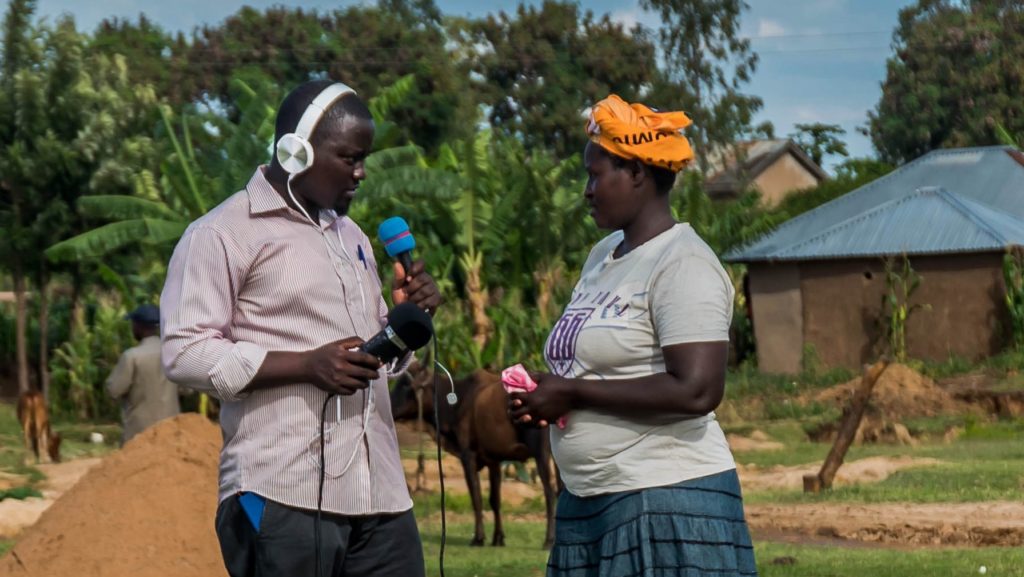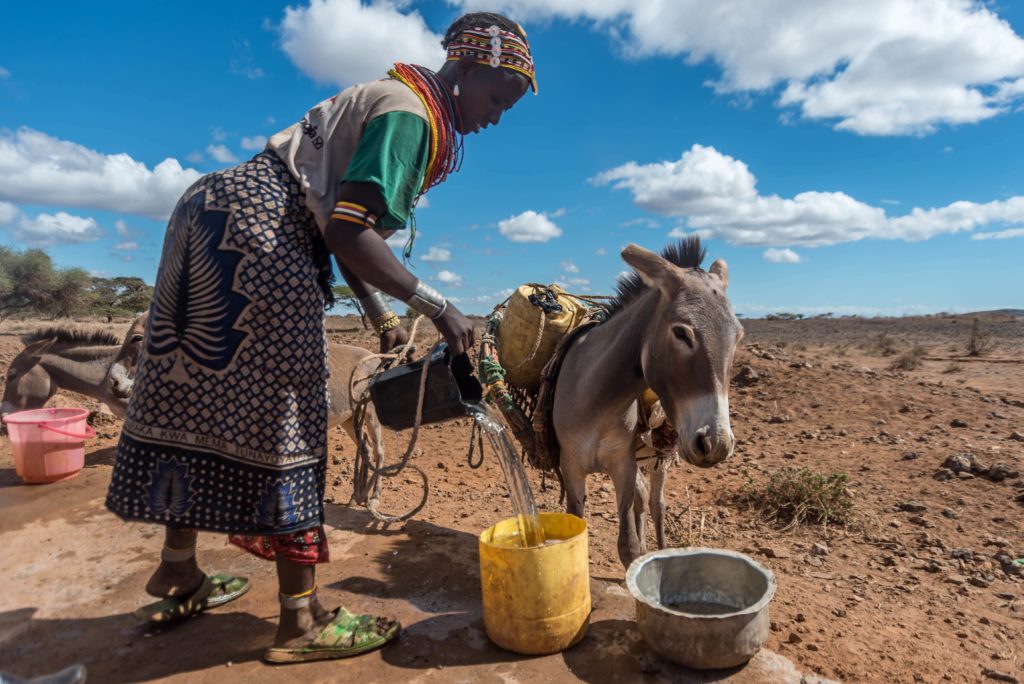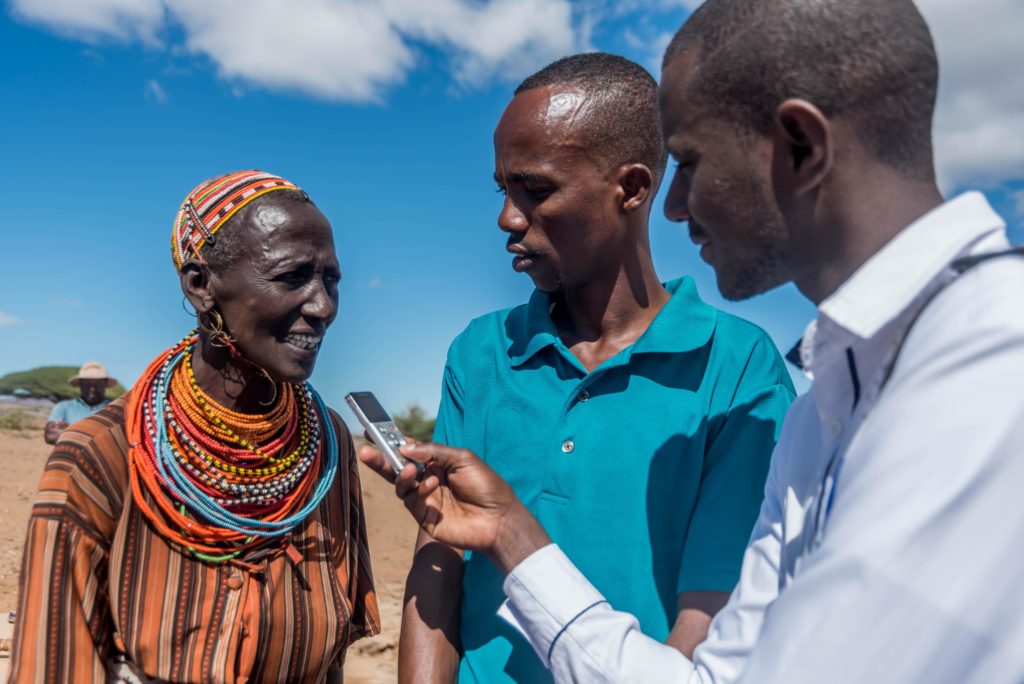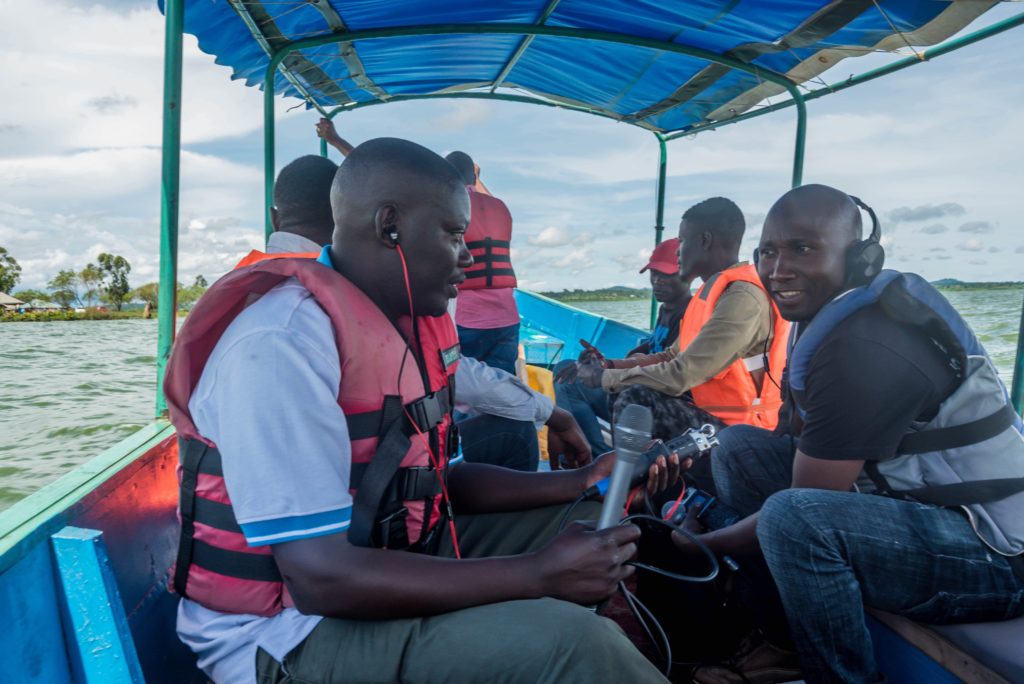E Co. Lunch breaks: BBC Media Action – Building climate resilience through local communication
5 October 2020, Category: All insights, News, Tags: lunch breaks

Photo: Producer from Gulf Radio (Western Kenya) interviews a former fishmonger who started farming her own fish in Homa Bay County due to reduced number of fish in Lake Victoria.
This article is written by Arjuna Weerasinghe – Senior Partnerships Manager, and Georgia May, Assistant Programme Manager, Global Partnerships, BBC Media Action. All photos are by Diana Njeru, Project Director, WISER.
BBC Media Action is the BBC’s international development organisation. Working with creative communication through trusted media, interpersonal communication and community mobilisation, their work enables people to ‘have their say, understand their rights and take action to transform their lives’. They reach 100 million people each year, often in poorer and more fragile environments, achieving impact at scale.
Areas of Focus
To meet audience information and communication needs, our work takes a holistic approach to address climate change, cross-cutting our key thematic areas. These include:
- Resilience: We support audiences to adapt to the impacts of climate change through programming on food and water security, economic security and disaster risk reduction – all of which is underpinned by a focus on climate and the environment.
- Governance: We support audiences to influence power. This includes connecting them with decisions makers to discuss issues such as public investment in clean energy, spending on infrastructure ready to withstand future shocks and stresses, and choices around land use, biodiversity and livelihoods. We also enable audiences to hold decision makers and leaders to account.
- Health: We explore the connections between climatic impacts and health, addressing issues such as infectious diseases, water, sanitation and hygiene (WASH), and clean cookstoves.
How does media and communication support local communities in developing countries?
Effective mass media and communication plays a critical role in meeting the information and communication needs of vulnerable and affected populations. It can:
- Provide access to timely, accurate, and practical information to help people make informed decisions and dispel misinformation
- Showcase influential role models demonstrating helpful attitudes, practices and norms
- Facilitate connections between people and decision-makers enabling them to communicate their needs and influence power around decisions that directly impact their lives.
- Catalyse and share innovative solutions
- Build confidence and self-efficacy
- Motivate positive action
How radio enables East African farmers and fisherfolk to adapt to changing weather
Through our Weather Wise project across Kenya, Tanzania and Uganda in partnership with the UK Met Office, we are working with 10 local radio stations to provide weather and climate information to farmers, fisherfolk and pastoralists in a way that supports them to make informed, practical decisions. Many are in poor, rural communities, often in hard to reach areas, and whose livelihoods are most affected by extreme weather and climate change.

Woman collecting water with her livestock.
Audience research to inform our programming revealed useful insights including a lack of trust in, and understanding of, scientific approaches to predict weather. People preferred to rely on indigenous beliefs that are becoming less accurate with more erratic weather.
Recognising the importance of communicating through channels that audiences trust and can access, plus in a language they understand, our research also informed the decision to focus on local radio and outreach. Our approach often supports and strengthens the ability of local media partners to better meet the information and communication needs of their audiences. This includes supporting them to conduct their own audience research and to communicate in a way that audiences can understand, are engaged, can make informed decisions and take positive action. This approach was particularly important for the topic of climate change because traditionally, journalists struggle to grasp complicated climate terminology, while scientists worry their information will be misconstrued. So our activities have focused on:
- Training and mentoring journalists to produce accurate, timely, relevant and practical weather and climate focused radio content, in local languages, and across a range of formats (e.g. factual and drama)
- Training journalists to set up radio listener groups to increase listenership and gather audience feedback for future programming
- Bringing scientists and journalists together to collaborate more effectively. Workshops have built new relationships between scientists and radio producers. They have enabled local radio producers to communicate accurate technical information from weather and climate experts to their audiences, and in ways that are useful. It has also supported experts to learn ways to break down technical information in a way that people impacted by climate change can understand, and which is focused on their decisions making needs.
Radio programmes are mostly features, magazine programmes and radio drama public service announcements (PSAs). Many programmes feature voices and experiences of fisherfolk, farmers and pastoralists as well as expert advice from climate scientists, technical experts and county extension officers. Topics in 2020 have included ways that farmers, fisherfolk and pastoralists could adapt to the impact of the June, July and August season, dealing with floods in Lake Victoria and the effects of climate change on milk production.

Producer from Sifa FM (Northern Kenya) interviews an elderly lady who, together with her entire village moved 200kms away in search of water in Marsabit County.
How we’ve adapted to COVID-19
The effects of COVID-19 have proved challenging, but since broadcast media has the ability to transcend physical access barriers, we have found ways to adapt. Initially, lockdown required some stations to broadcast repeat programmes. However, all radio partners resumed production after we provided journalists at local stations with airtime to conduct interviews and gather audience feedback via phone/SMS. Although radio listening groups were suspended due to restrictions on public gatherings, we adapted other elements of the project such as adopting a remote mentoring approach for partners radio stations. We have since resumed face to face training and mentoring, albeit socially distanced.
Results and impact of the project
The project is achieving significant results. BBC Media Action’s Research and Learning team has conducted monitoring and evaluative research with audiences, journalists and climate scientists/sector experts using methods including radio call-in programmes, listening groups facilitated by journalists, case studies and in-depth interviews. As of September 2020, Weather Wise has:
- Supported local media partners to collectively produce over 500 radio programmes with an additional 12 weather and climate focused PSAs.
- Trained 80 journalists and scientists/technical experts with 12 journalists across partner stations receiving remote mentoring from our Senior Broadcast Mentor

Journalists prepare to interview fisherfolk during an on-the-job mentoring session at Luzira Port Bell, Lake Victoria, Uganda.
Responses to Weather Wise from audiences and journalists:
This short film tells the story of the project and the impact it is achieving.
Audiences of the radio programmes reported increased access to climate and weather information, in a language and format they can understand. A fisherman in Homabay, Kenya said:
“I like that the radio programme is done in my local language Dholuo. This is the most common language we communicate in and the programme being in my local language is easy to understand and share the information with others.”
Audiences also reported improved knowledge of weather and climate related issues. They like that weather forecasts are followed by advice from experts on how to respond to such information:
“…we learn how to deal with the effects of weather and climate change through such activities as water harvesting, selling our animals during the dry season, irrigation and planting more drought resistant crops.” Female pastoralist from a listening group, Turkana, Kenya
Audiences have reported increased usage of weather and climate information in their everyday lives which has enabled them to mitigate the impact of weather changes on their livelihoods.
“In one of the programmes, they shared how the rains would fail and the different things we could do as farmers to cope, including planting more drought resistant seed varieties. I planted these on my farm that season and was able to get a much better harvest than my neighbours, most of whom lost their entire crop.” Female farmer, Kyanamukaka, Uganda
Journalists reported improved knowledge and understanding of weather and climate issues and improved editorial and production skills to develop weather and climate content . A journalist we supported at Bukkede FM in Uganda told us:
“I am now more knowledgeable in this topic and…I am now able to correctly interpret and translate it to my audience in a way they can understand and use it in their daily lives.”
Similarly, journalists and climate scientists/sector experts reported working with each other and improved capacity to effectively communicate on weather & climate information to target audiences. A weather analyst in Uganda working with a partner radio station supported by our work said:
“My communication of weather information has improved greatly in that I am now more sensitive to the needs of the audience and I am keen on making sure that they understand the weather forecasts and what that means for their day to day lives.”
What’s next for Weather Wise
The project continues until late 2020 and audience feedback and recommendations continue to inform the development of programming. Such feedback and recommendations include:
- Translating the programmes into more local languages, as well as further simplifying technical terms and communicating them in local languages additional to Kiswahili, particularly among pastoralist communities. These insights were shared with radio partners and a number have now diversified their broadcast languages.
- Some local radio stations such as Maata Radio in Turkana do not reach certain communities which means they have not received early warning for extreme weather events, such as floods and drought. To address this and increase reach, BBC Media Action has engaged two additional radio stations in the area.
Looking forward: Leveraging the power of media and communication to increase the impact of climate finance investments
The power of audience-centred mass media and communication to drive transformative ways of tackling the climate crisis has huge potential, but is still undervalued among the climate change community.
Climate finance can yield stronger impacts if:
- Media and communication is given an integrated role within larger initiatives that address climate change.
- Relationships between technical experts and media professionals are established and nurtured, especially among those in the Global South.
- Evidence and learning around how media and communication can support climate action is generated and delivers insights for multiple stakeholders
BBC Media Action is actively seeking partnerships with climate change funders and other change-makers to enable us to continue designing and delivering creative, methodologically robust and impactful programming while strengthening the evidence base for ‘what works’.
To discuss opportunities to collaborate with BBC Media Action, please contact:
Arjuna Weerasinghe – Senior Partnerships Manager, BBC Media Action
Weather Wise is part of the Met Office’s Weather and Climate Information Services for Africa (WISER) project, funded by the UK Foreign, Commonwealth and Development Office
Join the conversation by posting a comment below. You can either use your social account, by clicking on the corresponding icons or simply fill in the form below. All comments are moderated.